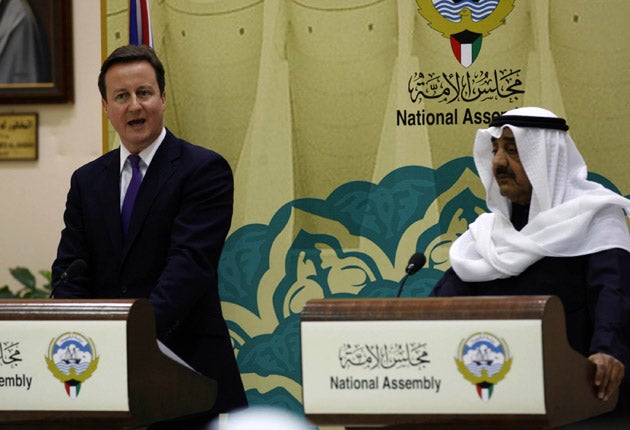PM calls for aid cuts for repressive states

Your support helps us to tell the story
Our mission is to deliver unbiased, fact-based reporting that holds power to account and exposes the truth.
Whether $5 or $50, every contribution counts.
Support us to deliver journalism without an agenda.

Louise Thomas
Editor
David Cameron is pressing for Middle East countries that fail to reform to be stripped of hundreds of millions of pounds of EU aid.
As the Prime Minister prepared for talks in Qatar on the latest leg of his tour of Gulf states, he sent a senior official to Brussels for talks over the future of the £1.5 billion a year project.
Around £200 million a year of British taxpayers' cash goes to an EU project to promote better governance in the region.
But a senior official travelling with Mr Cameron said Britain believed the scheme had failed and that the EU must "turn off the tap" on states that do not meet their side of the bargain.
The premier has used his visits to push the case for democratic reforms in the region in the wake of popular uprisings in Egypt and Tunisia and continuing rebellion in Libya and elsewhere.
Egypt, which Mr Cameron visited on Monday 10 days after Hosni Mubarak's regime was ousted by mass protests, receives one of the biggest shares of the £1.5 billion a year Neighbourhood Policy.
But while it had introduced EU standards on toys and vehicles and created a consumer protection agency as part of the deal, it had failed to lift a 30-year emergency law and done "very little" to curb the use of torture, the official told reporters.
Libya, where demonstrations against the rule of Muammar Gaddafi have been brutally repressed, Tunisia, which threw out its president, Morocco, Algeria, Israel, Jordan, Lebanon and Syria also benefit.
But the call for curbs to the cash also raised questions about the future EU support for the Palestinian Authority which is highly dependent on such outside help.
The official did not rule out an impact on the impoverished area but said every case would have to be examined on its merits.
Mr Cameron set out his determination to reduce the payments to fellow heads of state at a recent EU summit and in talks at Downing Street last week with Commission President Jose Manuel Barroso.
High-level officials are travelling to Brussels today from member states for further discussions - with France believed to be among the most significant objectors to the call.
The official said the demands were not part of the UK's negotiations over the future EU budget but were "in line" with its bid to rein in Brussels spending at a time of domestic austerity across Europe.
A similar policy of attaching conditions to financial help had worked with eastern European countries hoping to join the EU "but is has completely failed in this region", the official said.
"On all the big things you would expect the EU to stand up for there has been very little progress.
"At the same time we continue to pour money into Egypt and other countries of the region.
"There needs to be much greater conditionality applied. The EU can have an influence in this part of the world but it has got to be tougher and it has got to be willing to turn the tap off if we don't see results.
"We can't be in this position where we are using our taxpayers' money, other member states' taxpayers' money...when we are not getting anything in return."
The Prime Minister will meet with the Emir of Qatar and its prime minister as well as holding a question and answer session with students. He has repeatedly highlighted the role played by young people in leading the Mid East revolts and warned that failing to offer them change and better prospects will fuel extremism.
Tomorrow he will appear on video hosting website YouTube to answer questions submitted by users.
The internet has played a prominent role in the organisation of the protests, with regimes under threat closing down access in a bid to prevent co-ordination and stop evidence of repression emerging.
The Prime Minister began the day by visiting Shell's vast new gas-to-liquid (GTL) facility in Qatar - the biggest installation of its kind.
Known as Pearl, it is due to begin operations this year converting Qatari gas into a cleaner-burning liquid fuel that, it is hoped, will be used in aviation.
Many UK firms are involved in the project.
Mr Cameron was given a tour of part of the complex under construction by Shell executive vice president and Pearl boss Andy Brown. He chatted with workers and viewed the inside of the control centre.
Subscribe to Independent Premium to bookmark this article
Want to bookmark your favourite articles and stories to read or reference later? Start your Independent Premium subscription today.
Join our commenting forum
Join thought-provoking conversations, follow other Independent readers and see their replies
Comments